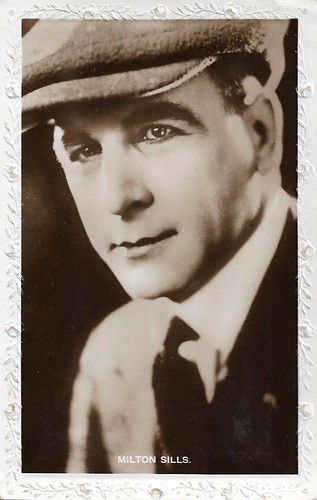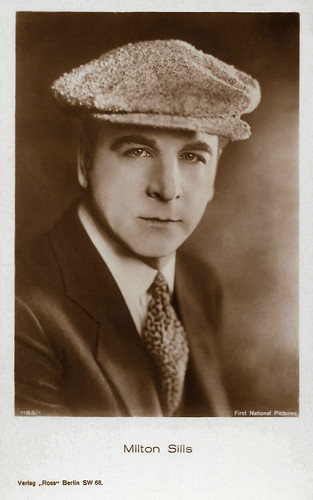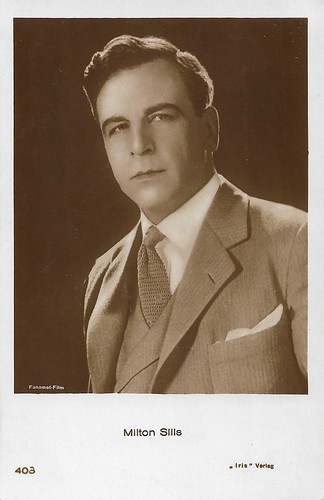Milton Sills (1882-1930) was a major American silent film actor and university professor. His relatively early death and his unusual career made him a legend.

Danish postcard by Stenders Kunstforlag, no. 39. Photo: First National Pictures. Nazimova and Milton Sills in Madonna of the Streets (Edwin Carewe, 1924).

Danish postcard by Eneret, no. 725. Photo: First National. Corinne Griffith and Milton Sills in Single Wives (George Archainbaud, 1924).

Danish postcard by J. Chr. Olsons Kunstforlag, Eneret. Photo: Milton Sills in The Making of O'Malley (Lambert Hillyer, 1925).

Danish postcard by J. Chr. Olsons Kunstforlag, Eneret. Photo: Milton Sills and Doris Kenyon in The Making of O'Malley (Lambert Hillyer, 1925).

Danish postcard by J. Chr. Olsons Kunstforlag, Eneret, no. 536. Photo: Milton Sills and Enid Bennett in The Sea Hawk (Frank Lloyd, 1924).
Milton George Gustavus Sills was born in 1882 in middle-class Chicago, Illinois, U.S. He was the son of William Henry Sills, a successful mineral dealer, and Josephine Antoinette Troost Sills, an heiress from a prosperous banking family.
Upon completing high school, Sills studied philosophy and psychology at the University of Chicago and worked there first as a researcher and later as a professor in both sections.
In 1905, stage actor-manager Donald Robertson visited the school to lecture on author and playwright Henrik Ibsen and suggested to Sills that he try his hand at acting. On a whim, Sills gave up his position to embark on a stint in acting. He joined Robertson's stock theatre company and began touring the country.
In 1908, he played on Broadway already. He made his Broadway debut in 'This Woman and This Man'. It was again a success. From 1908 to 1914, Sills appeared in about a dozen Broadway shows.
In 1910, Sills married English stage actress Gladys Edith Wynne, a niece of actress Edith Wynne Matthison. The union produced one child, Dorothy Sills. Gladys filed for divorce in 1925.
Wooed by producer William Brady, Sills made his film debut in 1914 in the big-budget drama The Pit (Maurice Tourneur, 1914) for the World Film Company. It was another success. Sills made three more films for the company, including The Deep Purple opposite Clara Kimball Young.
Jim Beaver at IMDb: "His stalwart personality and handsome looks brought him a following, and his talent extended to a wide variety of roles in an equally wide variety of genres."
Sills worked for various companies in the 1910s, including that of Clara Kimball Young. He acted with Irene Castle (aka Mrs. Vernon Castle) in the 15 episodes Pathé serial Patria (1917), directed by Leopold & Theodor Wharton (episodes 1-10) and Jacques Jaccard (11-15). It was an anti-Japanese propaganda, and funded by William Randolph Hearst in the lead-up to the US's entry into World War I.

British postcard. Photo: Pathé Frères Cinema Ltd.

American postcard. Milton Sills in One Clear Call (John M. Stahl, 1922).

British postcard.

French postcard by Editions Cinémagazine, no. 300.

Romanian postcard. Photo: Viola Dana and Milton Sills in The Silent Lover (George Archainbaud, 1926).
By the early 1920s, Milton Sills had become a matinee idol, working for various film studios, including Metro Pictures, Famous Players-Lasky, and Pathé Exchange.
In 1923 he was Colleen Moore's leading man in the box office hit Flaming Youth (John Francis Dillon, 1923). In his retrospective essay 'Echoes of the Jazz Age, writer F. Scott Fitzgerald cited Flaming Youth as the only film that captured the sexual revolution of the Jazz Age.
His biggest success was The Sea Hawk (Frank Lloyd, 1924), the top-grossing film of that year. It is a silent adventure film about an English noble sold into slavery who escapes and turns himself into a pirate king. The film is based on the 1915 novel by Rafael Sabatini.
In 1926 he scripted Men of Steel (George Archainbaud, 1926), in which he acted opposite Doris Kenyon, whom he married in the same year. She became his second wife and in 1927, their son, Kenyon Clarence Sills, was born.
Sills was in 1927 one of the co-founders of the Academy of Motion Picture Arts and Sciences. He was also a founding member of Actors' Equity in 1913.
As early as 1928, Sills had begun to make the transition to sound pictures with the part-talking The Barker (George Fitzmaurice, 1928) with Dorothy Mackaill, Betty Compson, and Douglas Fairbanks Jr. His last film was the sound version of The Sea Wolf (Al Santell, 1930).
Milton Sills died in 1930 of a heart attack during a game of tennis with his wife at their Brentwood home in Los Angeles. He was only 48. He was interred at the Rosehill Cemetery and Mausoleum in Chicago, Illinois.
Posthumously in 1932, his book 'Values: A Philosophy of Human Needs – Six Dialogues on Subjects from Reality to Immortality' was published. It was co-edited by Ernest Holmes.

German postcard by Ross Verlag, Berlin, no. 730/1, 1925-1926. Photo: Transocean-Film-Co, Berlin.

German postcard by Ross Verlag, Berlin, no. 1185/1, 1927-1928. Photo: First National Pictures.

German postcard by Ross Verlag, no. 1249/1, 1927-1928. Photo: Paramount-Film.

German postcard by Ross Verlag, no. 1249/2, 1927-1928. Photo: Paramount-Film.

German postcard by Ross Verlag, no. 2006/1, 1927-1928. Photo: First National / Fanamet. Betty Bronson and Milton Sills acted together in Paradise (Irvin Willat, 1926).

Austrian postcard by Iris Verlag, no. 403. Photo: Fanamet-Film.

Swedish postcard by Ljunggrens Konstforlag, Stockholm, no. 282. Photo: Campbell Studio, N.Y.

Danish postcard by J. Chr. Olsons Kunstforlag, Eneret, no. 724. Photo: Milton Sills and his daughter.
Sources: Jim Beaver (IMDb), Wikipedia and IMDb.

Danish postcard by Stenders Kunstforlag, no. 39. Photo: First National Pictures. Nazimova and Milton Sills in Madonna of the Streets (Edwin Carewe, 1924).

Danish postcard by Eneret, no. 725. Photo: First National. Corinne Griffith and Milton Sills in Single Wives (George Archainbaud, 1924).

Danish postcard by J. Chr. Olsons Kunstforlag, Eneret. Photo: Milton Sills in The Making of O'Malley (Lambert Hillyer, 1925).

Danish postcard by J. Chr. Olsons Kunstforlag, Eneret. Photo: Milton Sills and Doris Kenyon in The Making of O'Malley (Lambert Hillyer, 1925).

Danish postcard by J. Chr. Olsons Kunstforlag, Eneret, no. 536. Photo: Milton Sills and Enid Bennett in The Sea Hawk (Frank Lloyd, 1924).
Stalwart personality and handsome looks
Milton George Gustavus Sills was born in 1882 in middle-class Chicago, Illinois, U.S. He was the son of William Henry Sills, a successful mineral dealer, and Josephine Antoinette Troost Sills, an heiress from a prosperous banking family.
Upon completing high school, Sills studied philosophy and psychology at the University of Chicago and worked there first as a researcher and later as a professor in both sections.
In 1905, stage actor-manager Donald Robertson visited the school to lecture on author and playwright Henrik Ibsen and suggested to Sills that he try his hand at acting. On a whim, Sills gave up his position to embark on a stint in acting. He joined Robertson's stock theatre company and began touring the country.
In 1908, he played on Broadway already. He made his Broadway debut in 'This Woman and This Man'. It was again a success. From 1908 to 1914, Sills appeared in about a dozen Broadway shows.
In 1910, Sills married English stage actress Gladys Edith Wynne, a niece of actress Edith Wynne Matthison. The union produced one child, Dorothy Sills. Gladys filed for divorce in 1925.
Wooed by producer William Brady, Sills made his film debut in 1914 in the big-budget drama The Pit (Maurice Tourneur, 1914) for the World Film Company. It was another success. Sills made three more films for the company, including The Deep Purple opposite Clara Kimball Young.
Jim Beaver at IMDb: "His stalwart personality and handsome looks brought him a following, and his talent extended to a wide variety of roles in an equally wide variety of genres."
Sills worked for various companies in the 1910s, including that of Clara Kimball Young. He acted with Irene Castle (aka Mrs. Vernon Castle) in the 15 episodes Pathé serial Patria (1917), directed by Leopold & Theodor Wharton (episodes 1-10) and Jacques Jaccard (11-15). It was an anti-Japanese propaganda, and funded by William Randolph Hearst in the lead-up to the US's entry into World War I.

British postcard. Photo: Pathé Frères Cinema Ltd.

American postcard. Milton Sills in One Clear Call (John M. Stahl, 1922).

British postcard.

French postcard by Editions Cinémagazine, no. 300.

Romanian postcard. Photo: Viola Dana and Milton Sills in The Silent Lover (George Archainbaud, 1926).
The only film that captured the sexual revolution of the Jazz Age
By the early 1920s, Milton Sills had become a matinee idol, working for various film studios, including Metro Pictures, Famous Players-Lasky, and Pathé Exchange.
In 1923 he was Colleen Moore's leading man in the box office hit Flaming Youth (John Francis Dillon, 1923). In his retrospective essay 'Echoes of the Jazz Age, writer F. Scott Fitzgerald cited Flaming Youth as the only film that captured the sexual revolution of the Jazz Age.
His biggest success was The Sea Hawk (Frank Lloyd, 1924), the top-grossing film of that year. It is a silent adventure film about an English noble sold into slavery who escapes and turns himself into a pirate king. The film is based on the 1915 novel by Rafael Sabatini.
In 1926 he scripted Men of Steel (George Archainbaud, 1926), in which he acted opposite Doris Kenyon, whom he married in the same year. She became his second wife and in 1927, their son, Kenyon Clarence Sills, was born.
Sills was in 1927 one of the co-founders of the Academy of Motion Picture Arts and Sciences. He was also a founding member of Actors' Equity in 1913.
As early as 1928, Sills had begun to make the transition to sound pictures with the part-talking The Barker (George Fitzmaurice, 1928) with Dorothy Mackaill, Betty Compson, and Douglas Fairbanks Jr. His last film was the sound version of The Sea Wolf (Al Santell, 1930).
Milton Sills died in 1930 of a heart attack during a game of tennis with his wife at their Brentwood home in Los Angeles. He was only 48. He was interred at the Rosehill Cemetery and Mausoleum in Chicago, Illinois.
Posthumously in 1932, his book 'Values: A Philosophy of Human Needs – Six Dialogues on Subjects from Reality to Immortality' was published. It was co-edited by Ernest Holmes.

German postcard by Ross Verlag, Berlin, no. 730/1, 1925-1926. Photo: Transocean-Film-Co, Berlin.

German postcard by Ross Verlag, Berlin, no. 1185/1, 1927-1928. Photo: First National Pictures.

German postcard by Ross Verlag, no. 1249/1, 1927-1928. Photo: Paramount-Film.

German postcard by Ross Verlag, no. 1249/2, 1927-1928. Photo: Paramount-Film.

German postcard by Ross Verlag, no. 2006/1, 1927-1928. Photo: First National / Fanamet. Betty Bronson and Milton Sills acted together in Paradise (Irvin Willat, 1926).

Austrian postcard by Iris Verlag, no. 403. Photo: Fanamet-Film.

Swedish postcard by Ljunggrens Konstforlag, Stockholm, no. 282. Photo: Campbell Studio, N.Y.

Danish postcard by J. Chr. Olsons Kunstforlag, Eneret, no. 724. Photo: Milton Sills and his daughter.
Sources: Jim Beaver (IMDb), Wikipedia and IMDb.
No comments:
Post a Comment